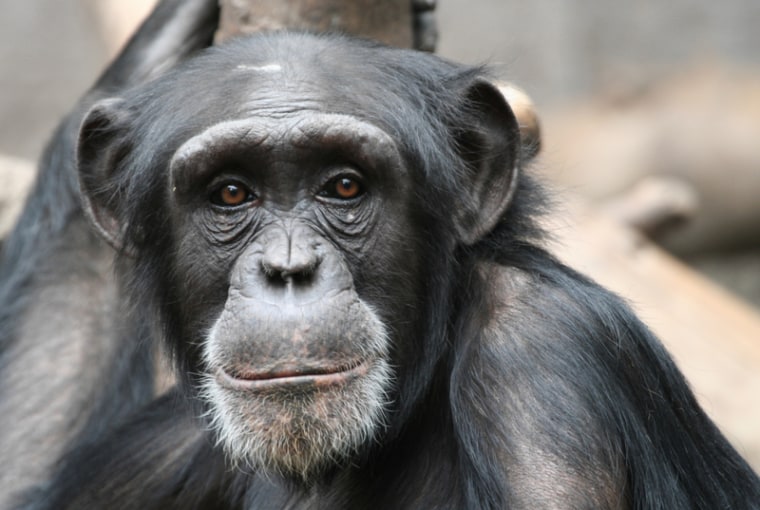Chimpanzees, long considered reluctant to share, apparently can display selfless tendencies, revealing one more key way our closest living relatives are like humans, scientists find.
These findings could shed light on the evolution of altruism in humans, showing that selflessness is less of an anomaly among our relatives than before suggested, researchers added.
In recent years, research has revealed just how much chimpanzees have in common with us. They can hunt with spears, play with improvised dolls and mourn their dead.
However, past experiments had suggested that chimps were loath to share, being what scientists had classified as antisocially selfish instead of pro-socially altruistic. This led to a widely held belief that human altruism evolved only after humans split from their ape cousins about 6 million years ago.
"For the past decade we have lived through the curious situation — frustrating for many chimpanzee fieldworkers and observers — that chimps are well known for spontaneous acts of altruism, yet have not shown the same tendencies in well-controlled experiments," said researcher Frans de Waal, a primatologist at Emory University in Atlanta.
It turns out this past failure to find such altruistic behavior might have been due to the experiments on the chimpanzees themselves.
"Most earlier studies had presented the apes with a complex apparatus that helped them deliver food to themselves or others, often so complicated that the experiments tested tool skills rather than social tendencies," de Waal told LiveScience. "Ours is the first study that uses no such apparatus at all."
In addition to using complex food-delivery systems, past experiments often placed the chimpanzees so far apart that they might not have realized how their actions benefited others.
Simple tests of altruism
In these new, simplified experiments, two apes were housed next to each other with a screen through which they could see each other. Then, one chimpanzee had to choose between two differently colored tokens from a bin, one of which represented a pro-social option, the other a selfish option. The pro-social option would cause both chimpanzees to receive a piece of banana wrapped in paper. (The paper made a loud noise upon removal, helping chimps to know that another was benefiting from his actions.) The selfish option only rewarded the ape who made the choice.
In a study with seven adult female chimps placed into various pairs, the scientists found all the apes showed a definite preference for the pro-social option.
"For me, the most important finding is that like us, chimpanzees take into account the needs and wishes of others," researcher Victoria Horner, a comparative psychologist at Emory University, told LiveScience.
"The idea that chimps are indifferent to the welfare of others can now hopefully be put to rest," de Waal said.
The chimpanzees behaved especially altruistically toward partners who either patiently waited or gently reminded them that they were there by drawing attention to themselves. They were less likely to reward partners who exerted pressure by making a fuss, begging persistently or spitting water at them.
"This is interesting because there has been a long-standing view that the chimpanzees only share food under pressure," Horner said. "Our results suggest the opposite — chimpanzees share when there is no to little pressure, but direct pressure or threats reduce sharing, possibly due to negative emotions."
Evolution of altruism
The researchers say these findings, along with studies showing other primate species with similar tendencies, suggest pro-sociality may have deeper evolutionary origins than previously thought.
Past research had shown that chimpanzees were capable of altruistically providing assistance. "Our results are subtly different," Horner said. "When you provide assistance, it's really a test between doing something or nothing. In our study, the chimps really have three choices — they can do nothing, they can be pro-social or they can be selfish."
The current studies were conducted with chimpanzees of all one sex to simplify its design, as including both sexes would have added complex questions of why the chimps might or might not have shared.
"Many anecdotal reports of altruism in both the wild and captivity involve females, but that's not to say that males aren't also altruistic," Horner said. Also, "researchers may be unintentionally focusing more on female altruism because they expect to see it more in females than males."
In addition, "males may show their pro-social side in different contexts," she added. "For example, reports from the wild indicate that female chimpanzees use tools more frequently than males, but our previous research with captive chimpanzees has shown that males are just as good as females at tool use. It's just that males in the wild have other priorities, such as border patrols and hunting, so that we don't see their tool-using abilities as frequently as we do with females. The same may be true of male pro-sociality."
"Gender differences would be an interesting study for future research," Horner concluded.
Horner and de Waal detailed their findings online Aug. 8 in the Proceedings of the National Academy of Sciences.
Follow LiveScience for the latest in science news and discoveries on Twitter @livescience and on .
